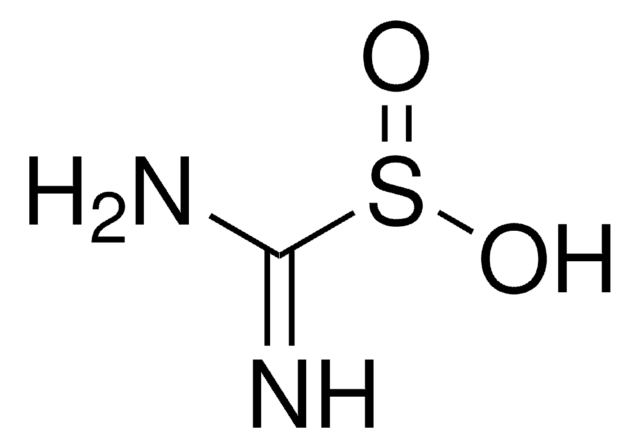71699
Sodium hydrosulfite
≥82% (RT)
Synonym(s):
Sodium dithionite, Sodium hypodisulfite
About This Item
Recommended Products
assay
≥82% (RT)
form
powder
reaction suitability
reagent type: reductant
pH
7.0-9.0 (20 °C, 50 g/L)
anion traces
chloride (Cl-): ≤50 mg/kg
cation traces
Ca: ≤50 mg/kg
Cd: ≤5 mg/kg
Co: ≤5 mg/kg
Cr: ≤5 mg/kg
Cu: ≤5 mg/kg
Fe: ≤5 mg/kg
K: ≤50 mg/kg
Mg: ≤5 mg/kg
Mn: ≤5 mg/kg
Ni: ≤5 mg/kg
Pb: ≤5 mg/kg
Zn: ≤5 mg/kg
SMILES string
[Na+].[Na+].[O-]S(=O)S([O-])=O
InChI
1S/2Na.H2O4S2/c;;1-5(2)6(3)4/h;;(H,1,2)(H,3,4)/q2*+1;/p-2
InChI key
JVBXVOWTABLYPX-UHFFFAOYSA-L
Looking for similar products? Visit Product Comparison Guide
Application
- Porphyrin-based covalent organic frameworks as doxorubicin delivery system for chemo-photodynamic synergistic therapy of tumors.: This study investigates the use of porphyrin-based covalent organic frameworks to enhance the delivery of doxorubicin for combined chemotherapy and photodynamic therapy in tumor treatment. The research demonstrates improved therapeutic efficacy through this synergistic approach (Chen et al., 2024).
- Interactions between Damaged Hair Keratin and Juglone as a Possible Restoring Agent: A Vibrational and Scanning Electron Microscopy Study.: The article explores the restorative effects of juglone on damaged hair keratin, utilizing vibrational spectroscopy and scanning electron microscopy. The findings suggest potential applications in hair care products to repair and protect hair structure (Di Foggia et al., 2024).
- Comparative Transcriptome Analysis Reveals the Molecular Mechanisms of Acetic Acid Reduction by Adding NaHSO3 in Actinobacillus succinogenes GXAS137.: This research delves into the molecular mechanisms behind the reduction of acetic acid in Actinobacillus succinogenes GXAS137 when treated with sodium hydrosulfite, revealing significant transcriptomic changes and potential pathways involved (Li et al., 2023).
- Reduced graphene oxide coated alginate scaffolds: potential for cardiac patch application.: The study evaluates the use of reduced graphene oxide-coated alginate scaffolds for cardiac patch applications, demonstrating enhanced mechanical properties and biocompatibility, suggesting its potential for cardiac tissue engineering (Baheiraei et al., 2023).
- Three birds, one stone: Disinfecting and turning waste medical masks into valuable carbon dots for sodium hydrosulfite and Fe(3+) detection enabled by a simple hydrothermal treatment.: This innovative research presents a method to recycle waste medical masks into carbon dots for detecting sodium hydrosulfite and Fe(3+), combining disinfection and waste reduction with the creation of useful nanomaterials (Li et al., 2023).
Other Notes
signalword
Danger
hcodes
Hazard Classifications
Acute Tox. 4 Oral - Eye Irrit. 2 - Self-heat. 1
supp_hazards
Storage Class
4.2 - Pyrophoric and self-heating hazardous materials
wgk_germany
WGK 1
flash_point_f
Not applicable
flash_point_c
Not applicable
ppe
Eyeshields, Gloves, type P3 (EN 143) respirator cartridges
Certificates of Analysis (COA)
Search for Certificates of Analysis (COA) by entering the products Lot/Batch Number. Lot and Batch Numbers can be found on a product’s label following the words ‘Lot’ or ‘Batch’.
Already Own This Product?
Find documentation for the products that you have recently purchased in the Document Library.
Customers Also Viewed
Our team of scientists has experience in all areas of research including Life Science, Material Science, Chemical Synthesis, Chromatography, Analytical and many others.
Contact Technical Service













